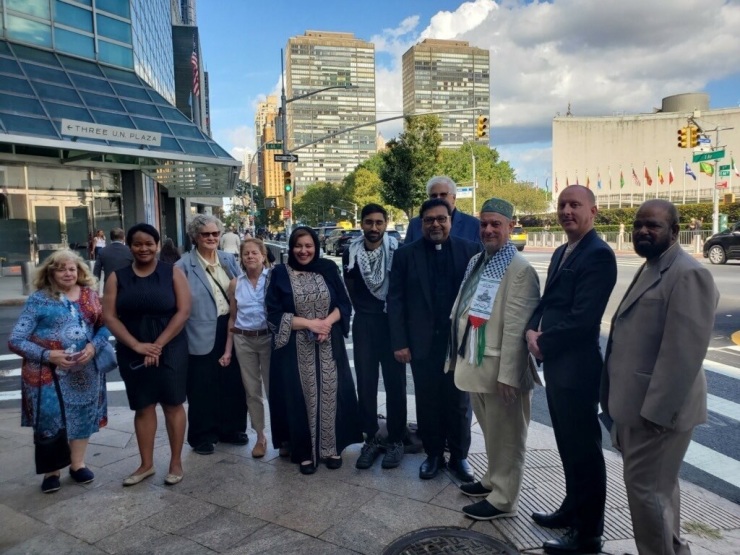
As world leaders descended upon Manhattan for the annual United Nations General Assembly, a different kind of summit had convened on Friday, 20 September 2024, at 777 United Nations Plaza. Religious leaders, activists, and representatives of civil society converged in an interfaith press conference titled "The Scourge of Religious Nationalisms." Voices from across different faith traditions came together to condemn gross distortions of religion by use of governments and other political actors to advance supremacist and nationalist agendas worldwide.
The conference was sponsored by the Religious Nationalisms Project, Federation of Indian American Christian Organizations of North America, New York State Council of Churches, Indian American Muslim Council, Hindus for Human Rights and the Dalit Solidarity Forum among others to address how religious nationalisms-from Hindu nationalism in India to Christian nationalism in the U.S.-have stoked violence, repression, and enabled autocratic regimes.
Rev. Neal Christie, Executive Director of FIACONA (Federation of Indian American Christian Organizations), spoke with great articulateness about the dangers of religious nationalism, especially in India. He questioned Indian PM Narendra Modi's approach, saying, "Instead of a summit of the future, Mr. Modi has created a valley of despair for over 1.4 billion people as he leads in propagating a hegemonic myth of a Hindu supremacist state, leaving no room for the 90% of the population who live as Dalits and oppressed castes, religious minorities, and disenfranchised, Indigenous peoples in India."
Christie also noted the alarming rise in persecution of Christians across India citing that in 2023 alone, "religious nationalists weaponised an operation of the Hindu faith to attack 1570 Christians and murder over 200 more." He called for an independent, multilateral Truth and Reparations Commission into the systemic harm to Christians and other religious minorities by the government of India.
Speaking on behalf of progressive Hindus and South Asians in the diaspora, Nikhil Arur from Hindus for Human Rights offered comments. He denounced the spectre of Hindu nationalism, known as Hindutva, and its ideal of "an ever-expanding national territory that criminalizes religious minorities, Dalits, indigenous Adivasis, and all marginalized peoples." Arur also compared Hindutva with other forms of religious nationalism, such as Zionism: "The violent Hindutva ideology represented by Modi and his counterparts in the BJP is intimately tied to the violent Zionist ideology that is fuelling the year-long genocide perpetrated by Israel in Gaza."
The discussion was expanded to include critiques of U.S. policies by the Executive Director of the New York State Council of Churches, Rev. Peter Cook, Principal of the Religious Nationalisms Project. He critiqued US President Biden on immigration and the Israeli-Palestinian conflict. “We decry President Biden's failure to forcefully challenge the way that Christian nationalism is weaponised against immigrants as he touts his efforts to be tough on the border," said Cook.
The press conference addressed a wide range of religious nationalism issues globally, including:
· The Israeli government's policies towards Palestinians and the ongoing conflict in Gaza.
· The Pakistani government's misuse of Islam to persecute Muslim minorities, Christians, and Hindus.
· The Taliban's use of Islam in Afghanistan to subjugate other Muslims and religious and ethnic minorities.
· The Nigerian, Iranian, and Iraqi governments' use of Islam to repress moderate Muslims, Christians, women, and those with a more secular orientation.
· The Burmese military's use of Buddhism to justify violence against Rohingya Muslims in Myanmar.
Other faith traditions were also represented through different speakers, a fact that underlined the interfaith character of the resistance against religious nationalism. They all impressively drove the point that religious nationalism, in whatever form it might take, threatens democratic values, human rights, and freedom of religion. They called for unity across progressive members of all faiths to stand in opposition against such ideologies and to protect the marginalized communities.
This press conference, while the United Nations General Assembly was taking place just a few blocks away, was aimed at reminding the world of battles still being fought against the political abuse of religion. The speakers urged world leaders to address these issues and challenged them to uphold the principles of secularism, human rights, and religious freedom in their respective countries.
Rev. Neal Christie, in a comment to Christian Today, outlined the conference's objectives: "First, we want to show a united front. Second, not allowing heads of state such as Mr. Modi to define the parameters for the conversation. Third, we hope to approach nation-states that are sympathetic so that they will hold Mr. Modi accountable."
The press conference concluded with a call to action, inviting attendees to protest the visits of Prime Minister Modi and other world leaders in the coming days. Additional events were planned for Sunday when Mr. Modi was scheduled to speak, organized by the Indian American Muslim Council.




